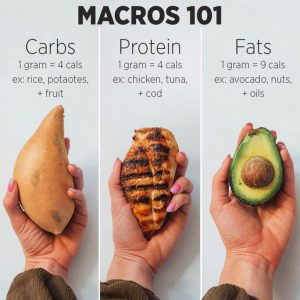
macros 101
CARBOHYDRATES. PROTEINS. FATS.
Macronutrients are nutrients we need in larger quantities than other nutrients. They provide us with energy and contain our micronutrients.
WHY MACROS MATTER
Macros play an important role in controlling your intake of food. They also keep you full and make it easier to not overeat. A simple meal like grass-fed steak, pasture-raised eggs, and sliced avocado contains all 3 macronutrients all while keeping you satiated for the majority of your day.
CARBOHYDRATES – This is your body’s major energy source. There are two types. Simplex and complex carbohydrates. Simplex carbs are mostly made from refined foods and sugars. They are absorbed quickly by your body and if not used they will turn into fat. Complex carbs are mostly whole fruits and vegetables. The fiber content in these foods allows for slow absorption giving your body time to process and burn it before turning it into fat.
PROTEINS – Your body’s “construction workers” so to speak. It is how and why you can build muscle. You have complete proteins from meats. You have incomplete proteins from vegetables and supplemental proteins. Much like carbohydrates, if excess protein goes unused it can turn into fat causing weight gain. Be sure the higher your protein intake the more consistent your resistance training is.
FATS – An extremely important resource that we were told for years is bad for you to consume. This simply is not the case. Eating fat DOES NOT make you fat. Fat and body fat aren’t the same thing. Dietary fat aids in hormone balance, satiety, and the ability to absorb fat-soluble vitamins A, D, E, and K.
“MACROMANAGEMENT”
Conventional wisdom suggests management of your macros at 20%-30% fat, 30% protein, and 40%-50% carbohydrates. As stated above, these should come from healthy whole food sources.
From here, how you manage your macros depends on your goals and your body type. If you are body building you want to be eating 4-6 meals per day which all contain the 3 macronutrients. If you want to lose weight you may be into intermittent fasting. Make sure you consume the 3 macronutrients in those short eating windows if that’s the case.
This discipline requires consistency to be effective. Tracking your calories daily and making sure your sugar intake is below 6-8g per serving.

Leave a Reply
You must be logged in to post a comment.